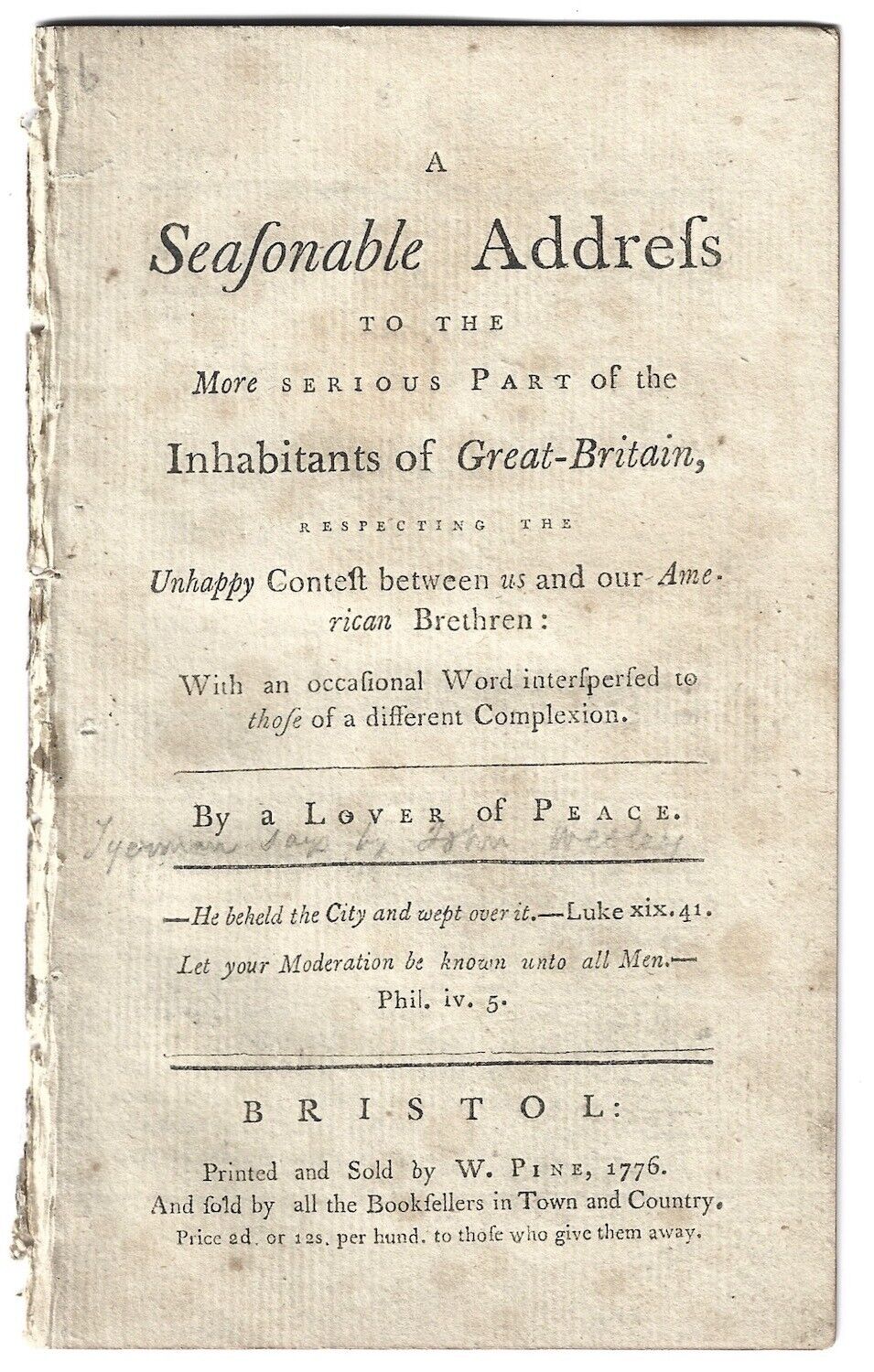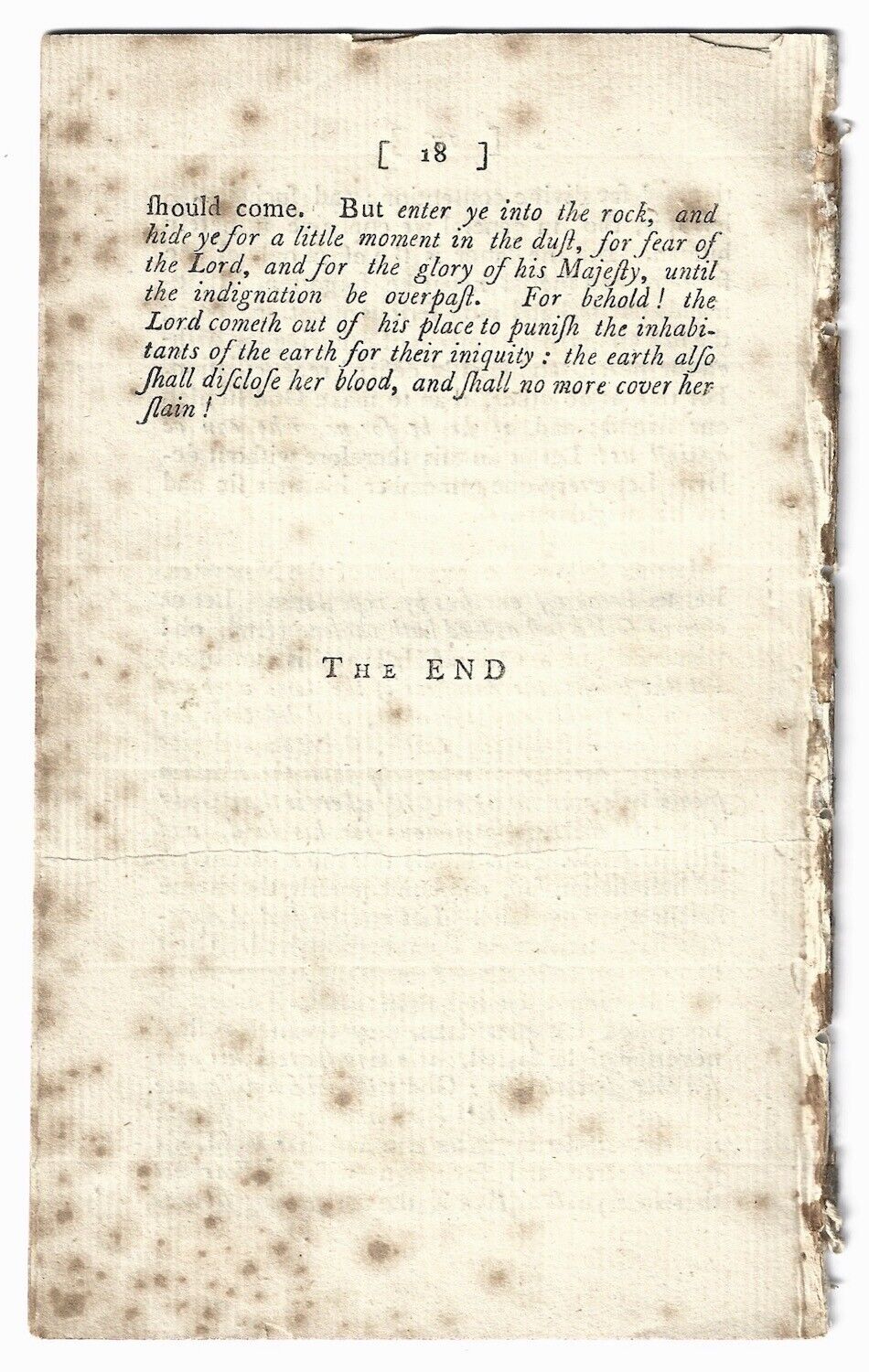Specs Fine Books
1776 JOHN WESLEY. An Address on the Unhappy War Between Great Britain and Our American Brethren. RARE!
1776 JOHN WESLEY. An Address on the Unhappy War Between Great Britain and Our American Brethren. RARE!
Couldn't load pickup availability
A very scarce and important work from the hand of John Wesley providing fascinating insight into the American Revolution and religious interactions with the conflagration.
Just the previous year, Wesley issued his Calm Address [which we have also just acquired], in which he urged Americans against rebellion and violence against England. That address at times at least to my ear, feels nationalistic, institutional, and I'm sure was a challenging read to many of its American readers. Whether it was a development in Wesley's thinking, pastorally motivated, or perhaps his internal reaction to the threat of violence had been clarified internally in the time between the two addresses, Wesley here is much more pastoral, theological, and missional. It is war, in any format, that is to be avoided, not just a crime against the monarchy or a nation. It isn't about preserving England so much, as about preserving the life-giving character of God's people; about preventing untold suffering to the poor, the soldier, the children, the widows; it was about a professedly Christian nation turning to self-murder. Here is John Wesley, a sort of missional pacifist, much, much more in his element.
Contextually, he addresses both British and Americans as brethren and plays the role of peacemaker, of pastor exhorting to the Kingdom of God rather than the Kingdom of men.
Excerpt:
"Stop here then, my brethren, and survey the desolation. Behold the weeping and disconsolate widow refusing to be comforted! Her beloved husband is fallen! is fallen! and is no more! See the affectionate parent holding down his head like the bulrush! Hear the broken language of his heart! 'My son! my son! would God I had died in thy place! O my son! my son!' This is far from the flight of imagination, or the colour of fancy. It is the real and actual condition of many amongst that unhappy people, and a part only of their manifold distress. In a word, they and we appear to be a people infatuated like the Jews of old, and ripening for destruction . . . here stop then, and drop a tear for the slain of our people, through the fire of contention that is kindled amongst them.
Then turn your eyes and behold superior number at a little distance, of their brethren, 'flesh of their flesh, and bone of their bone,' who only a few years since emigrated to the dreary wilds of America. These also are followed by the most tender feelings of wives, children, and countrymen. See, they advance toward each other, well prepared with every instrument of death. What are they going to do? To shoot each other through the head or heart; to stab and butcher each other . . . brother goes to war against brother, and that in the sight of the Heathen!"
It would be a really fascinating study to contrast Wesley's theology of Kingdom with the National-Covenantal / Kingdom theology of the Presbyterian clergy arguing for the American Revolution, also on religious and missional grounds. This difference of kingdom perspective, or location, endures to this day in the community of faith.
It's a superb, heart-searching read with fascinating historical content.
A Love of Peace [Pseud. John Wesley]. A Seasonable Address to the More Serious Part of the Inhabitants of Great-Britain, Respecting the Unhappy Contest between us and our American Brethren: With an Occasional word interspersed to those of a different Complexion. Bristol. Printed and Sold by W. Pine. 1776. First Edition. 18pp.
Good, crisp text with some light scattered foxing, small closed tear at head of final page, title clear and bright with probably 19th century or early 20th century pencil note referencing Methodist historian Luke Tyerman's attribution of the present work to the pen of John Wesley.
We should note, though published under A Lover of Peace, the work is universally recognized as being from the hand of Wesley [See Tyerman, Standard Library Cataloguing from Gale, Stanford, and its inclusion in the Works of Wesley as early as 1830].
Wesley likely published it anonymously and removed the standard printer note that his works were available for sale at all Methodist Chapels for two reasons: First, he wished the work to have a wider distribution than among the Methodists. And second, just the previous year, he issued a work rather harshly reprimanding the Americans and their rebellion which went through many editions and spawned a highly publicized volley of pamphlets between he and those opposing him. It seems likely he surmised his name and a strong Methodist attachment to the title page might limit the readership in light of his strong anti-American views the previous year.
We note no remotely recent examples at auction. Very desirable.
Share




